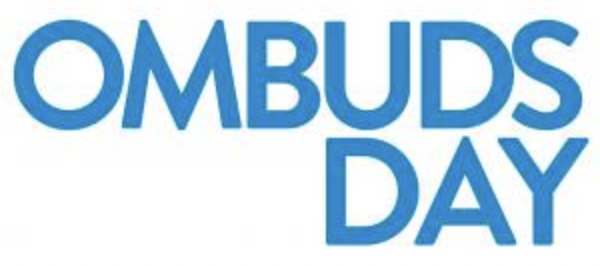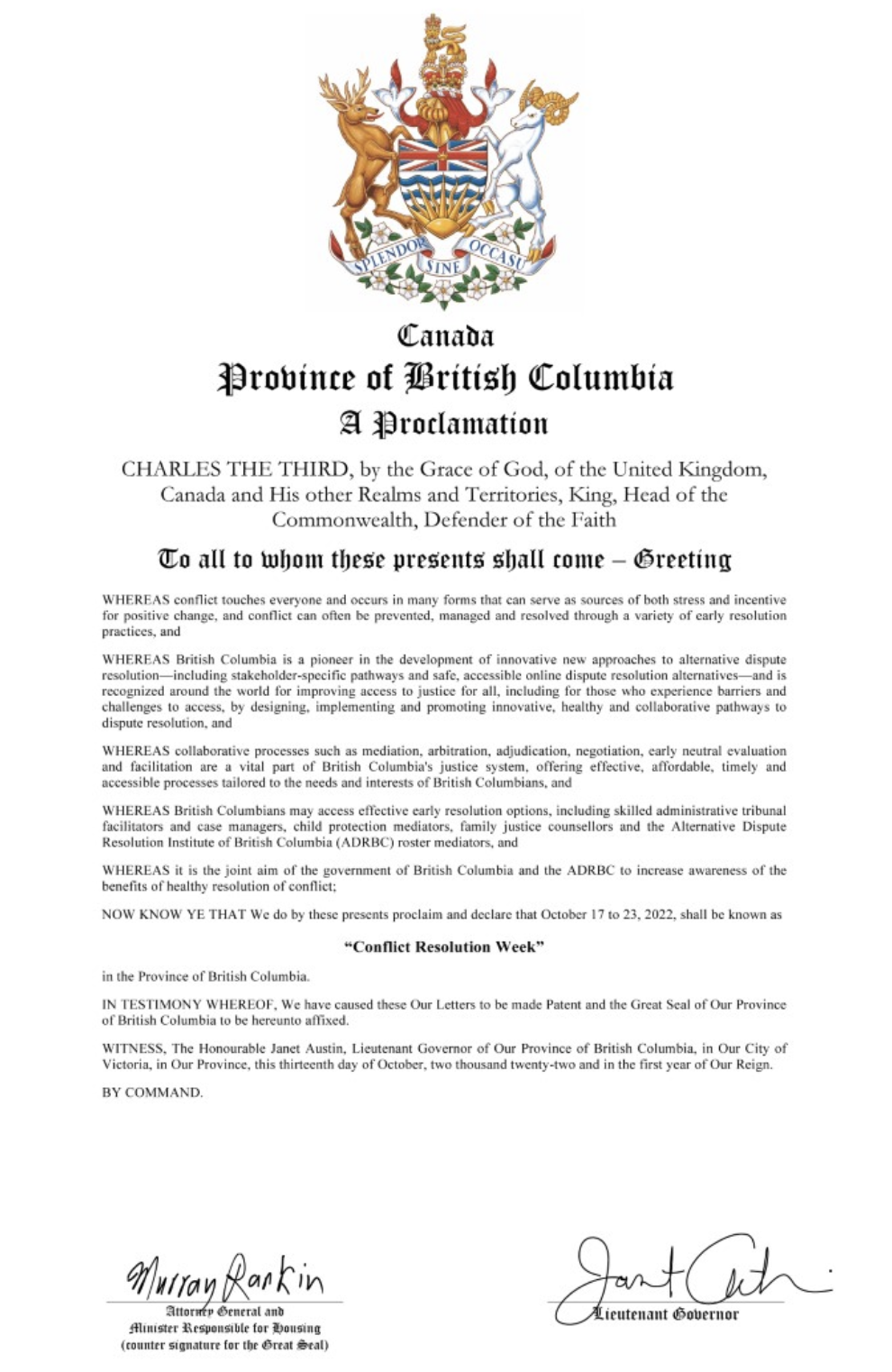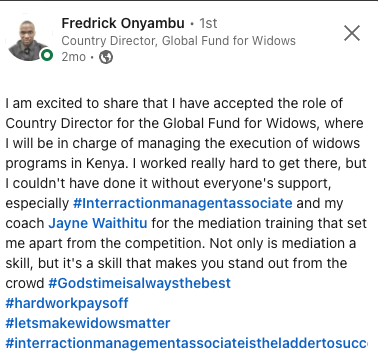Building on the momentum of International Peace Day, which occurs every year on September 21, October ushers in more opportunities to celebrate the conflict resolution field. Specifically, Ombuds Day, Mediation Week, and Conflict Resolution Day are designed to highlight alternative dispute resolution options. It is not possible to create sustainable peace on a small or large scale without the work of mediators, ombuds and other professionals committed to peaceful conflict resolution. Conflict naturally occurs in our workplaces, schools, homes, and communities. When addressed courageously and managed wisely, conflict can be a catalyst for positive transformation of relationships. These three celebrations in October raise awareness of strategies that can be used to peacefully navigate conflict and elevate the work of professionals committed to promoting peaceful means to resolving conflicts. They also remind us that more than a single day or week, the world is embracing conflict resolution!
Ombuds Day
For the last five years, Ombuds Day has been celebrated on the second Thursday of October. Ombuds Day helps to educate the public about the role of ombuds, promote the use of ombuds, and celebrate the impact that they make in their communities and organizations.
Elizabeth Hill, Associate Director of the University of Colorado at Boulder Ombuds Office explains the word “ombudsman” comes from a Scandinavian term that translates to “representative” in the English language. An ombudsman or “ombuds” as they’re commonly called, is a neutral third-party that operates within an organization and seeks to manage conflict. Howard Gadline explains the difference between ombudsing and mediation. One of the key distinctions is that an ombuds may employ tools and skills used in mediation, but they may also be more directive. An ombuds may coach an individual, make suggestions or connect a party to the resources they need to resolve the dispute.
There are several types of ombudsman, such as:
Legislative ombuds, such as the Arizona Ombudsman-Citizens’ Aide, for example, are designed to make government more responsive and transparent to citizens by handling citizens’ complaints against government agencies. Legislative ombuds usually have authority to offer a variety of options, including coaching an individual about options available to resolve the dispute, contacting an agency in question, mediating between citizen and agency, or elevating a complaint to an investigation, when needed.
Organizational ombuds, according to Hill, is defined as “a designated neutral who is appointed or employed by an organization to facilitate the informal resolution of concerns of faculty, staff, students, and, sometimes, external clients of the organization.” Organizational ombuds exist in the public and private sectors.
Media ombuds, such as the “Public Editor” at National Public Radio, promote transparency and truthfulness by investigating complaints about news that has been reported.
Conflict Resolution Day
Since 2005, the Association for Conflict Resolution has marked the third Thursday of October as Conflict Resolution Day. It was conceived by ACR to:
Promote awareness of mediation, arbitration, conciliation, and other creative, peaceful means of resolving conflict;
Promote the use of conflict resolution in schools, families, businesses, communities, governments and the legal system;
Recognize the significant contributions of (peaceful) conflict resolvers;
Obtain national synergy by having celebrations happen across the country and around the world on the same day.
Conflict Resolution Day has grown into an international movement. Many organizations, such as the US Federal Mediation and Conciliation Service and the Canadian province of British Columbia, have elevated the ideals of the day into a weeklong celebration. Check this B.C. proclamation for 2022. Clearly, there is consensus conflict resolution deserves more than a day’s worth of attention!
Mediation Week
The American Bar Association designated an entire week to “educate the public about mediation.” More specific than conflict resolution, Mediation Week occurs during the third week of October, now encompassing Conflict Resolution Day.
If the world’s “largest association of lawyers and legal professionals” has elevated mediation to a weeklong celebration, you know our field has become indispensable.
Demand for peaceful options to conflict is on the rise, from the playgrounds to the boardrooms. At IMA, we strive to promote mediation through our services as well as our courses.
We recognize that this practice must grow beyond a day or week, as the world is embracing conflict resolution. Our goal is to make our training accessible to more potential mediators around the world. IMA trained mediators help demonstrate the benefits of mediation and its ability to be successful in diverse contexts and situations.
Mediation in the Workplace
Annjulian Wanjiku is an active participant in IMA’s Master Mediator program. She explains that she “first heard of mediation when Kenya was involved in post-election violence and mediation played the most important role of uniting the country.”
Since being trained, she feels better equipped to navigate conflict in her role as a member of the Peace Warriors Organization, a Kenyan-based nongovernmental organization which mediates community-level as well as volatile, high conflict cross-border disputes.
She also applies the skills she has learned in her workplace. As an accountant, Annjulian tells us she encounters conflict often. After building mediation skills through IMA’s New Mediator and Master Mediator training programs, she states that in relation to conflict, “I am now able to deal with it professionally whenever it happens without hurting anyone.”
Grace Welch has also realized the benefits of mediation in her work as a human resources professional. She shares what drew her to IMA’s mediation training program:
“over the years, both personally and professionally, I have received high regard from others characterizing me as someone fair; a good listener; an advocate, and someone who can deliver challenging or complex information to the receiving party in a way that is non-threatening, caring, and respectful. In life, all of us will encounter conflict with one another, but it does not necessarily make us a ‘bad’ or ‘wrong’ person. The way I see it, we are simply missing critical information from the other party to make the best-informed decision or take a particular course of action.
In my field of work, Human Resources, we are generally the messengers of change, which is a struggle for most employees (and human beings). So, I want to better assist employees/people with how to process change at work and in their personal lives—and how to make change a ‘win’ and not a ‘loss.’
When there is a conflict between employee-to-employee or employee-to-manager, my role is responsible for investigating a complaint and facilitating an informal or formal conflict resolution process. I have learned to handle these situations through professional experience and counseling education, not through a certification program. This year, I decided to be intentional about my development and commitment to become a more vital mediator or practitioner of conflict resolution.”
A graduate of IMA’s New Mediator course, Harriet Lesley has discovered the potential of combining mediation with her work as a psychologist. More specifically, Harriet says, “It is positive for people to make their own decisions where possible rather than having a decision imposed upon them. Mediation helps me help the clients in reaching a full outcome in relation to all issues, enabling the participants discuss matters openly in a safe and confidential setting and empowers them to make informed decisions for themselves and their families.”
As someone who is an organizing member of a nonprofit/nongovernmental organization (NGO), Sicelo Jantjies encounters conflict regularly. The non-profit called Vuka Youth Empowerment Movement in South Africa Eastern Cape province “empowers startups and existing NPO/NGOs, formal entities and informal. Vuka means ‘wake up.’ In a township population with 40 thousand plus people and an 80% unemployment rate for its youth, the organization assists in registration, administration, organizing training, planning, health and safety compliance, taxes and sponsorship.” Even though the staff are passionate about the work, they are not immune to conflict. With nine staff members from different backgrounds, conflict often arises. Sicelo explains that “we struggled to communicate and negotiate in confidence with sponsors, which kept us frustrated.” The application of his mediation skills has been essential to ensuring that internal conflict was resolved so that the organization could do the work that it set out to accomplish. Sicelo is so inspired by his newfound mediation skills, he has taken to social media to educate others about the mediation field, through short, multilingual videos he records within his township. As he ends with the clip on the right, “Mediation is the thing.”
Prince Chiona has dedicated his professional life to teaching peace through work with the International Peace Youth Group (IPYG) which is part of Heavenly Culture World Peace Restoration of Light (HWPL). Before discovering IMA, he had minimal knowledge of mediation. He explains that “a greater understanding came when I took IMA training that mediation plays a vital role in restoring disputes, enhance communication, reconciliation and much understanding towards each other and coming to an agreeable position.” Completing the IMA New Mediator Course gave him “adequate knowledge on how to resolve conflict. Peace is seen as a backbone of every country’s development.”
Lisa Tsirikos, of Washington, DC, is a leader, coach, mediator, and facilitator who has transitioned careers to pursue her strengths and passions and share them with others. She currently works for the Federal Emergency Management Agency (FEMA) where she manages a curriculum development team that designs, innovates, evaluates, and continuously improves courses for a diverse workforce responding to disasters. Lisa is also a mediator with the Federal Mediation and Conciliation Service (FCMS) Shared Neutrals Program where she mediates workplace disputes and is a regular facilitator through Soliya, an international non-profit that encourages young adults to engage with their differences constructively and promote empathy amongst their societies. Prior to serving with FEMA, Lisa served as a Spanish teacher, police officer, and local emergency manager who has honed her leadership style while working with military, police, and fire departments across the country to solve complex issues. She explained conflict plays a significant role in her workplace, “I currently supervise a team of employees developing training content for a large and complex federal agency. Trust me - there are conflicts EVERY SINGLE DAY - if not every single hour in every single meeting. Mediator Training gave me the skills to feel confident addressing conflict every day in the workplace.“ She was motivated to take the IMA New Mediator because “I had been looking for quite some time for a mediation program that I could do in conjunction with a busy day job (It is not easy for me to take a week off for something outside the scope of my regular duties.) IMA Mediation Training was the first of its kind that allowed for asynchronous learning. This allowed me the flexibility to keep working my day job, save my vacation days (for actual vacations!), and then attend to the Mediator program on weeknights and weekends as my schedule allowed. Once I got into the course - It went pretty quickly.”
Mediation Practices
Many IMA trained mediators have used their skills to launch successful mediation practices. For example, Cindy Williams enrolled in IMA’s Master Mediator course at the beginning of the COVID-19 pandemic because she was unable to continue volunteering at a local homeless shelter. Years before being trained by IMA, she had graduated from law school and was briefly introduced to mediation. She explains that “my volunteer work at a homeless shelter inspired me to help people experiencing conflict impacting their home - whether temporary or permanent.” Cindy hopes that her Arizona-based mediation firm, Mediate for Progress, will “focus on conflict between people that impact the home, and related areas. So, I am looking at vacation rental disputes, evictions, landlord/tenant, HOA, homeless populations, and community disputes (residential and commercial neighbors).”
Additionally, Alisa Kharis, of Blend Mediation in Portland, Oregon, provided an explanation of what inspired her to become a mediator and ultimately open her own mediation practice:
“Honestly, I have spent the majority of my life surrounded by people in conflict. My mom was a social worker, so she spent her life the same and I guess it trickled down as they say. She was my biggest inspiration because she was so supportive and my best friend up until she passed. She was also a very positive person and a good listener.
Then later, when I had been practicing law for a few years, I realized that the system we were placing clients in was not efficient, and often more detrimental to what they needed when transitioning their families through divorce, parenting and custody issues. In that regard, I was moved toward mediation as a cure for what ails us.
Finally, since I have always had a global perspective, I have observed that no matter how long we have been on this planet as a species, we have hardly evolved when it comes to violence, either in speech or deed. We continually choose war over peace. This I do not understand. And so, I guess it has become my mission to advance mediation, negotiation, collaboration, and healthy communication wherever it is needed. In short, my dream is for mediation to become a first resort to problem solving…not the last.”
Family lawyer, Joan Bundy, took the IMA New Mediator course and then later joined the IMA Master Mediator, stating the program, “has been a godsend to me in building my mediation skills and making me an even better resource for my clients in resolving disputes amicably and satisfactorily. I find the moot mediation sessions particularly helpful, not only the sessions themselves but the feedback and encouragement afterward. [IMA coaches] inspire me to be the best mediator I can possibly be.”
Life-changing Opportunities
One way to celebrate Ombuds Day, Mediation Week, and Conflict Resolution Day is to become a trained mediator yourself or advance your skills if you are already trained. If you are unsure what it takes to launch a mediation practice or to become a mediator, we developed this handy checklist to help you out.
IMA has multiple educational opportunities for you to develop mediation, negotiation, and conflict resolution skills. Equipped with these skills, you will be prepared to navigate disputes in your workplaces, schools, homes, and communities with ease and confidence.
These online courses allow you to participate regardless of your location and interact with participants from around the world during online, live simulations. The beauty of them is that you can participate in both the live/interactive portions and the foundational content on your schedule from your own location. All participants receive a Certificate of Completion at the end of the course. As more people become equipped to peacefully resolve conflict, sustainable peace will be realized.
Several of our mediators reach back to us during and after their training to share specific life-changing skills that they gained from the mediation course.
Grace Welch explains how the training she received plays into her role as a human resources executive:
“exceptional listening skills are imperative, and my challenge requires even more listening and reading through what disputants aren’t saying. This course also teaches me to unlearn some things or habits acquired from my profession. For example, my role expects me to ‘fix’ it or make it right. During IMA simulations, I have found myself trying to solve the problem between disputants a couple of times. No matter how well-intended, that is not the role of the mediator.
Additionally, mediators have the critical work of moving the mediation session along by keeping each disputants' issues and concerns straight by identifying, clarifying, and recapping the issue/concern back to the disputants. It keeps the disputants on topic and tasks. When done well, the mediator is effective, disputants have achieved direct dialogue (usually), and both parties feel equally heard. I want to achieve this level of style and effectiveness.
Joining IMA is one of the best decisions I’ve made this year. This course teaches me methodology and where my blind spots exist in conflict resolution, ultimately making me a stronger mediator. I so appreciate the simulations. There, I have the opportunity to engage virtually with other mediators globally to experience and learn various approaches and styles to mediation and broaden my network. The IMA learning content is terrific, and the simulations provide exposure to real-life scenarios. I am grateful for all the other mediators on this journey who, like me, have been vulnerable and authentic to the process.”
Cindy Williams shared how she’s been impacted by the “bridges to listening” taught by IMA: “AVECS (Acknowledge, Validate, Empathize, Clarify, and Summarize) has been the most beneficial skill. I wrote it down with large, bold print and placed it in my work area. It soon became a mantra for me. AVECS is a must-have tool for effective mediation and healthy communication.”
Mediator Fredrick Onyambu recently landed a job as Country Director of the Global Fund for Widows in Kenya. A fairly recent university graduate, he attributed IMA’s mediator training to this career success with the hashtag “#interactionmanagementassocitesistheladdertosuccess.”
Sociology professor, Paul Harasha, told us, “I have done a few things in my life....electrical engineering, social work, sociology faculty, diversity facilitator, etc but honestly never ever found my perfect niche. I don't know if mediation is my calling but I can't stop going through your lessons and doing my own research on ADR. It really fascinates me….Have no idea what this will look like practically for me but enjoying this process so far.”
When Kenya was in pandemic lockdown, Mariam Jalla, a mother and member of the Peace Warriors Organization, told us, “During this time where everyone is at home and there are small conflicts here and there among the siblings, those mediation simulations taught me to control my anger and to handle the issues differently.”
Mediation, as shown through the experiences of IMA community members, is effective in professional and personal settings, well beyond a single day or week!
Ideas for Celebrating the Conflict Resolution Field
Regardless of who or where you are, my guess is that you are surrounded by conflict or involved in some sort of conflict. Many are unaware of mediation and its potential. I would like to personally invite you to consider taking even simple steps toward building peace during the month of October and beyond.
Below are opportunities for you to explore ways to promote peaceful conflict resolution:
Get the free workbook, How to Respectfully Disagree, Like a Pro
Build your listening skills with our free checklist
Enroll in an IMA course
Join the Association for Conflict Resolution
Find your local ACR chapter
Check out Annual Ombuds Day celebrations
Join a Mediation Week webinar
Post a video clip or photo on social media about your mediation experience
Tell your social media network about a time that you peacefully resolved conflict
Share this article on your social media networks
Add your comments at the bottom of this article
Just remember that more than a day or week, our world is embracing conflict resolution year-round. What potential does it play in your life – personal or professional? Drop your comments below!














